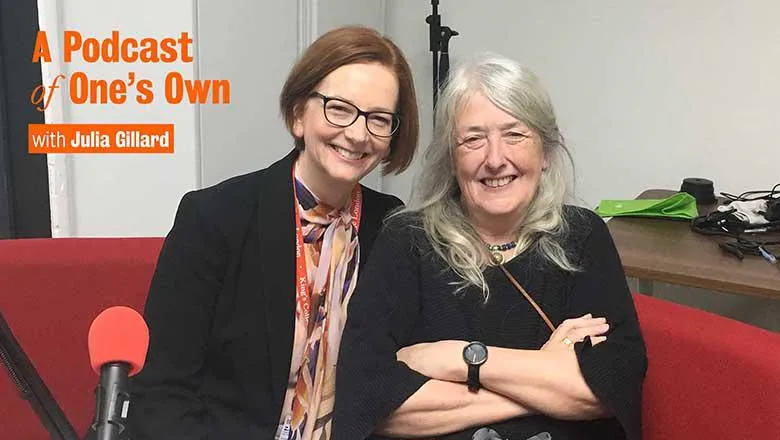20 March 2020
A Podcast of One's Own: Mary Beard on women in academia
The Cambridge professor and TV classicist Mary Beard is Julia Gillard’s latest podcast guest

National British treasure and arguably the world’s most famous classicist, Professor Mary Beard, features on our latest podcast episode. She talks to Julia about the first ever recorded example of misogyny in Ancient Greek mythology, fighting back when she was told she was “too ugly” for TV and why we need more women professors.
A Professor of Classics at the University of Cambridge, Beard has not only written numerous books on Roman civilisation and culture, she has also become a household name from presenting a series of popular BBC documentaries on the Romans.
Beard was fascinated by Greece and Rome from a young age. While Latin appealed to her as “a nerdish control freak”, going on archaeological digs with other teenagers was also “the perfect excuse to get away from Mum and Dad.”
Beard, who has previously said she “couldn’t imagine being a woman and not a feminist” first encountered sexism when she made it to Cambridge. She recalls an incident where a male friend expressed disbelief that her undergraduate essays had been awarded a First:
“It was in some ways a lightbulb moment that there were people you liked [who were sexist]. These weren’t crusty old conservative dons in the backwater of some old man’s college, this was one of my friends.”
Beard went onto become a lecturer in Classics, returning to Cambridge some years later where she was the only women in the entire department for five years. While there were challenges with being in an all-male team for so long, she “did have the confidence to call them out sometimes”, including when they forgot to clear up their coffee cups (“heaven knows what they said in the men’s loo afterwards”).
Having spent most of her career teaching in Cambridge, she was catapulted to fame at the age of 55 when she wrote and presented her first history documentary for the BBC. Despite being reluctant at first, she was persuaded into doing it by her desire to get more “ordinary-looking”, older women on TV:
“There was a kind of period where it looked as if you had to be a sort of 23-year-old size 0 in order to present a history documentary.”
Some TV critics preferred the status quo, including the Sunday Times critic who called her “too ugly for TV”. She was shocked by this attack on her appearance: “It’s a bit like someone punching you.”
But she fought back, writing a piece in the Daily Mail in which she said:
“I look like what a 55-year-old woman looks like unless she’s had an enormous amount of work done.”
Her comments chimed with the readership of the paper, many of whom were part of the same demographic as Beard, and the “piece of laddish wit rebounded on [the critic].”
Beard has also been the subject of vile social media vitriol, including being on the receiving end of social media pile-ons and Twitter storms:
“There is something extremely physically violent in the feel of it…this is an aggressive medium…It is the physical, unrelenting power that it comes across with that gets you.”
She tries to take the higher ground and call people out on their behaviour:
“If someone came up to me and said that, I wouldn’t let them walk by…I felt that I had to respond…It’s a nasty to weapon to respond with infinite politeness.”
As a Classicist, Beard has traced the origins of misogyny in her book Women and Power: A Manifesto, which she states is “written into Western literature, and it starts at the very, very beginning of it.”
The first example she quotes is from Homer’s Odyssey, in which Odysseus’s teenage son tells his mother: “Shut up…speech is man’s business,” which she says “equates male adulthood with silencing of women.”
On higher education, despite there being a majority of female students at universities in the UK, she says that this doesn’t translate in to higher numbers of women professors, who make up just over a quarter of the number. She discusses the challenge of recruiting more women professors:
“The problem is that what they see when they kind of think about what a professor is, when they think about the qualities that a professor has, those are already coded as men’s…they’re trying their best but…their imaginative job description is already a bloke.”
And women are not immune from this thinking:
“I picture a professor, what do I see? I see a man in a lab coat with a beard. For heaven’s sake, I am a female professor…we have to work on ourselves as well as the blokes.”
You can find this and previous episodes of A Podcast of One’s Own on all the main podcast platforms.
